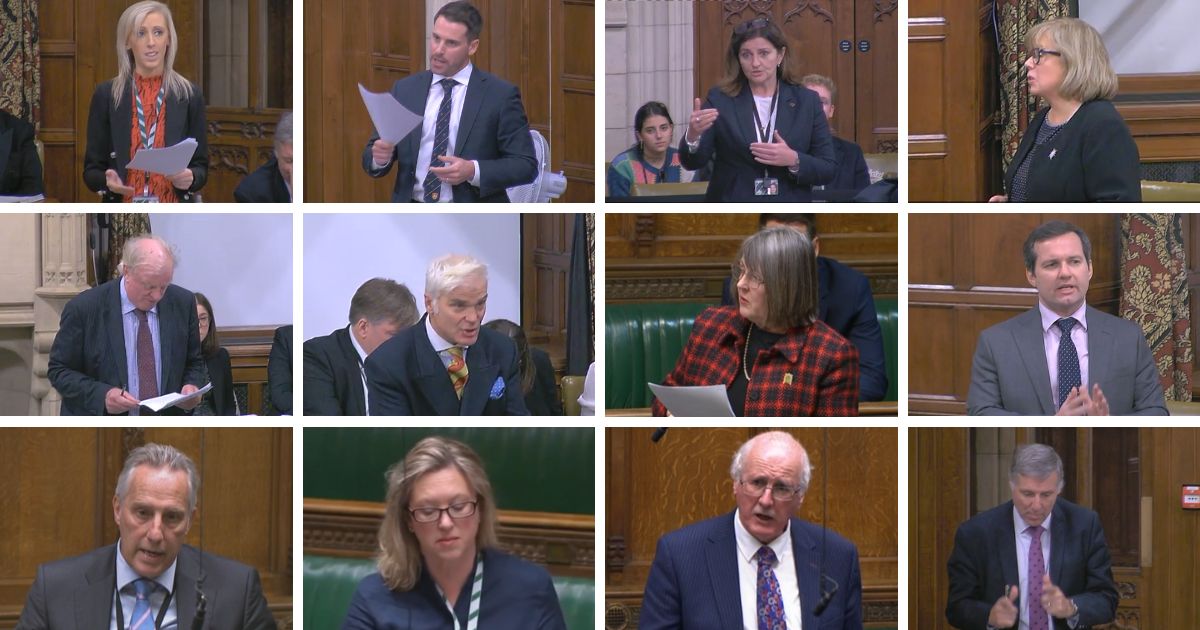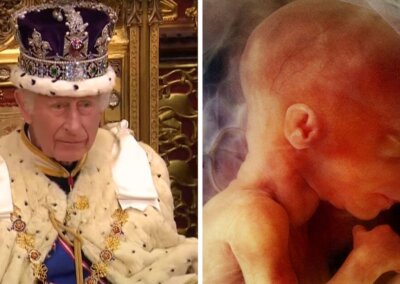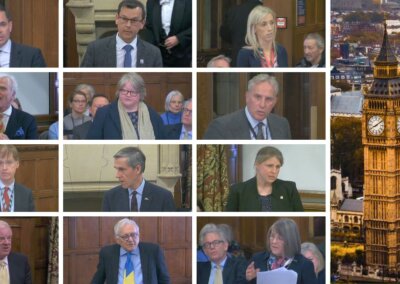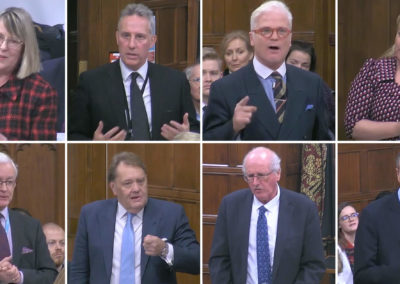A large line-up of MPs spoke in a debate that was held in Parliament this evening against introducing a ‘right’ to abortion into UK law.
The three-hour debate took place after a petition seeking to introduce a ‘right’ to abortion in the Bill of Rights Bill gained the required number of signatures to trigger a debate in Parliament.
The Government intends for the Bill of Rights Bill to replace the Human Rights Act 1998. Over the summer, Stella Creasy MP announced her intention to bring forward an amendment to the Bill to make access to abortion a human right. The Government’s position is that there is no need to include abortion in the Bill as the UK needs to be mindful to avoid the situation in the United States where this issue is re-litigated in the courts.
Removing the criminal law (Sections 58 and 59 of the Offences Against the Person Act 1861 and the Infant Life (Preservation) Act 1929) underlying abortion legislation would go far beyond just ‘decriminalising’ women, instead resulting in introducing abortion on demand, for any reason (including sex-selective abortion), up until birth.
This would leave England and Wales with one of the most extreme abortion laws in the world, and so we would move further away from the majority of countries in the European Union where the time limit for abortion is 12 weeks.
Jacob Rees-Mogg called 214,869 lives lost to abortion in 2021 a “tragedy”
Jacob Rees-Mogg MP spoke on the abortion issue for the first time in Parliament for a long period of time, as he had previously been curbed from speaking out on the issue in his position as a Government minister.
He gave a stirring speech where he said that 214,869 lives lost to abortion in 2021 is a “tragedy”.
He highlighted the sheer extent of lives lost to abortion, saying “When we think about this and we think of the numbers of 214,869… In a four-year period, the destruction of life is as great as it was in the four-year period of the first world war”.
“It is the great tragedy of abortion in that it is considered normal and that this extraordinarily high number of babies that are destroyed is something that should sadden us all to the depths of our souls”.
He also spoke out against making abortion a right, commenting “The idea that we would protect something that is so wrong and ignores that second life and that we should say that that is an absolute right on a par with free elections seems to me to be an absolute tragedy”.
There is no right in international law to abortion
Fiona Bruce MP explained that a right to abortion would conflict with international law and complicate domestic law. “Including abortion in a Bill of Human Rights is inappropriate and likely to result in extensive litigation to establish the extent of such a right”.
She also asked: “What type of society do we want to create for our country? Surely it is one which promotes a culture that upholds and respects life, including unborn life”.
She urged colleagues to develop laws that protect the lives of both the unborn child and women.
Labour MP, Mary Glindon, explained a number of her constituents are “very concerned” that changes to the law would lead to abortion up to birth, noted that many women actually want the time limit reduced, and advocated for greater attention to women’s aftercare, including mental health.
Sir Desmond Swayne MP argued that the US position – where abortion is a ‘right’ litigated in (and repealed by) the courts – is not desirable and it is “Much better to stick with the position that we have based on democratic provisions in this House and statute law”.
Chris Green MP questioned whether recognising a “legal right to abortion” would also allow a legal right to sex-selective abortion.
Sir Edward Leigh MP observed that the same MPs continue to hijack Government bills to restrict fundamental freedoms and weaken “the few laws and safeguards” in place regarding abortion. He noted that “in practice … we have one of the most liberal abortion rights in Europe”.
He argued that the authority to make and change abortion laws rests with Parliament. Making abortion a ‘right’ would enshrine the present laws and make them “beyond correcting, even when plainly needed”.
Large number of emails received ahead of the debate
Jim Shannon MP explained that polls in Northern Ireland show “…the majority of people are absolutely opposed to abortion on demand and the system of abortion that there is in Northern Ireland at this present time”.
He went on to outline that he has “received literally hundreds of emails” from his constituents of all ages and political and religious persuasions ahead of the debate on the importance of speaking up for life, and especially for the lives of both the woman and unborn child”.
“These debates always seem to focus … on the rights of the woman but the rights of the unborn child are disregarded as if they didn’t matter. I want to put it on the record my position … which is to protect the lives of both [women] and the unborn child”.
He echoed comments from Fiona Bruce MP emphasising there is no right to abortion in international law, and that the European Court of Human Rights has maintained this position for the last 30 years.
Challenging misinformation from the abortion campaigners
Scott Benton MP highlighted that claims that women’s access to abortion is becoming increasingly difficult were false.
He outlined “When you look at the evidence, you find that it has never been easier to access abortion in this country, particularly after the decision to allow medical abortions to happen at home. According to The Times, 1 in 4 pregnancies in Great Britain end in abortion. Last year saw 214,869 abortions in England and Wales in 2021 – the highest number since records began – nearly half of which are repeat abortions”.
He then went on to challenge claims from the abortion lobby that their campaign to remove abortion legislation is overwhelmingly supported by the public.
“The campaign to essentially decriminalise abortion often make the claim that they have overwhelming public support, in particular from women. When you look at the evidence, again, it does not bear this out. In fact, it points in the total opposite direction. Removing all legal restrictions would risk opening the door to late-term abortions on demand, right up until birth and for any reason”.
“Polling from Savanta ComRes paints a clear picture on how out of step this is with public opinion. Only 1% of women wanted the 24-week gestational time limit to be extended, while 70% of women favoured a reduction in time limits”.
Removing abortion law will impact women
Carla Lockhart MP outlined the negative impact that repealing abortion law would have on women who have been coerced into having an abortion.
She outlined cases where men who have forced women to miscarry or have an abortion were charged under the criminal law that abortion campaigners want to remove.
She outlined the case of Caroline Craft “She had been in a relationship with Matthew Cherry, a former police officer, and they broke up when she refused to have an abortion”.
“When she was six months pregnant, Miss Craft opened her front door to find an attacker, who turned out to be Mr Cherry, who punched her repeatedly in her stomach and back in a way that targeted her unborn baby to cause miscarriage”.
“At sentencing, the judge remarked that this ‘was a pernicious and evil attack’, which involved ‘a high degree of planning’. Fortunately, Craft recovered from her injuries and gave birth to a healthy baby boy. A jury convicted Mr Cherry of attempting to cause grievous bodily harm with intent and he was sentenced to ten years’ imprisonment”.
Right To Life UK spokesperson Catherine Robinson said “An overwhelming majority of MPs speaking in the debate spoke against introducing a ‘right’ to abortion in UK law”.
“The MPs who spoke made it clear that polling shows the vast majority of the general population and women reject pro-abortion proposals to introduce abortion right up to birth. In fact the majority of women want to see our abortion limit reduced to twenty weeks or below”.
“Thank you to everyone who took the time to email their MP asking them to oppose introducing extreme changes to abortion legislation. Your work writing to your MPs ensured that such a large group of MPs spoke out tonight in Parliament against making extreme changes to abortion legislation”.












